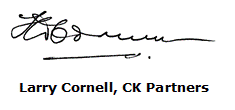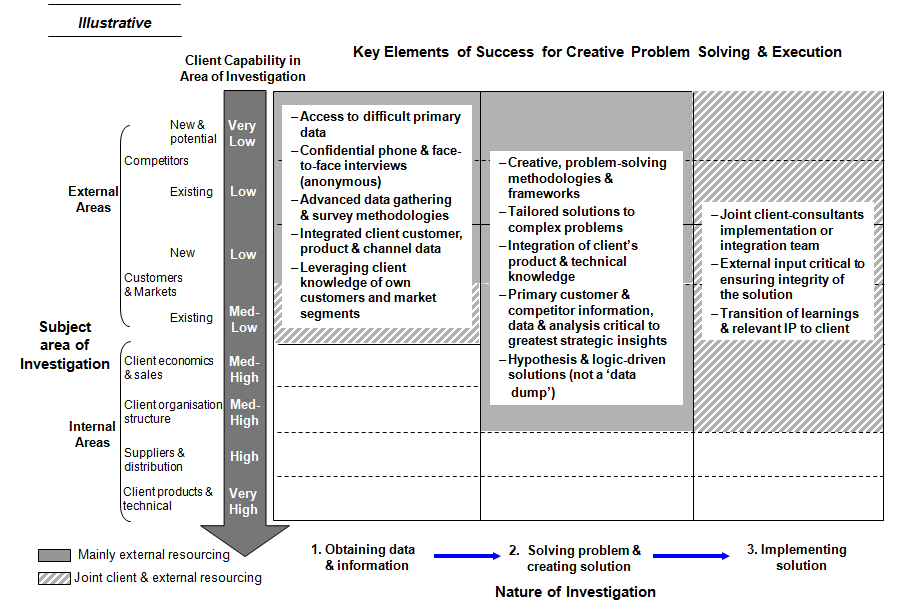The greatest strategic insights exist outside your organisation: The greatest value, especially with more complex jobs, comes from the common observation that clients tend to know least about their customers and in particular their competitors. It is this information that is hardest to access. Therefore, the consultant’s ability to obtain difficult to access, new primary data on customers and competitors is critical to providing the greatest insights and new business value.
*****
In Part 1 of this three-part series on How to Choose a Management Consultants, the point was made that while most clients know what you can get management consultants to do and why they are used, clients are less clear about the outsourcing options and the different payoffs of success versus the cost of the job failing to deliver the desired outcome of the outsourced option. The more complex the job and, hence, the more critical the job to the client’s organisation, the greater the potential upside and net payoff likelihood from using consultants compared to the higher opportunity cost (including failure) of using other options, such as external training or employing the capability into the client organisation.
Having made the decision to outsource the job to be solved largely by external management consultants, Part 2 of this series considered how to maximise the value and impact of the chosen consultants on your organisation. In this regard, two questions need to be considered: first, are you clear about what you want and your organisation’s capability to work with the external resources of the consulting firm and second, what is it that you need to know about and ask the consultants to ensure you have chosen the right ones?
This final Part 3 of the series draws on key themes from Parts 1 and 2 and is about ensuring the client organisation aligns the management consulting capabilities to the right job and type of problem to be resolved. This alignment requires a close understanding of the relative contributions of the client and the consulting team as well as understanding the capabilities of the team to access and analyse new data to obtain new insights that only primary data will provide.
Figure 1 illustrates the relative problem-solving strengths and capabilities of the client and the external management consultants, and the key elements for successfully accessing the data and insight necessary to create a tailored solution to a complex strategic challenge.
There are two important issues here. The first is to ensure you have understood and have aligned the relative problem-solving strengths and capabilities of the client’s internal resources versus those that the external consultant may offer. For complex assignments, the consultants will need to leverage the client’s capabilities in terms of product and technical knowledge, suppliers and distribution arrangements, current organisation structure, and current sales and business economics.
However, the greatest strategic insights are likely to come from investigating and analysing your customers and competitors, both existing and potential. Usually, this is not an area that client organisations have a strong competence. It is not possible or practical for a client to attempt to access primary data, say via phone calls to their competitors. Lack of objectivity, if not access to analytical frameworks, prevents clients asking the most penetrating questions of their own customers let alone their competitors’ customers.
This leads to the second issue; namely, that the specific capabilities and strengths of the chosen management consultant must align accurately with the type of assignment and the problem to be solved. You might say that it’s a case of ‘horses for courses’. At one extreme, it has not been the forte of market research firms to go beyond the broad market or customer survey. Even then, the data is often presented to the client for interpretation and development of the solution. Many management consulting firms, some quite large, have felt ‘uncomfortable’ with anything but high level competitor analysis.
To obtain these insights, the data required typically is difficult to access and must be obtained through confidential interviews and surveys using sophisticated approaches and methodologies. Without these capabilities, the information gathered and the resultant solution will be ineffectual and worse may cause lasting damage to business value, especially from the strategic opportunity foregone.
Figure 1: Choosing a Management Consultant: Relative Problem-Solving Strengths & Capabilities: Client vs. Strategy Management Consultant
It must be remembered that it is the quality of new data that provides new insights that are the essential foundation to creative analysis and tailored solutions to complex problems such as how best to enter a new market, the strategic value of an acquisition target, or the competitive response to a new or potential entrant into our marketplace.
If you would like to find out more and how this issue might apply to your business then contact us via the Contact Form.


